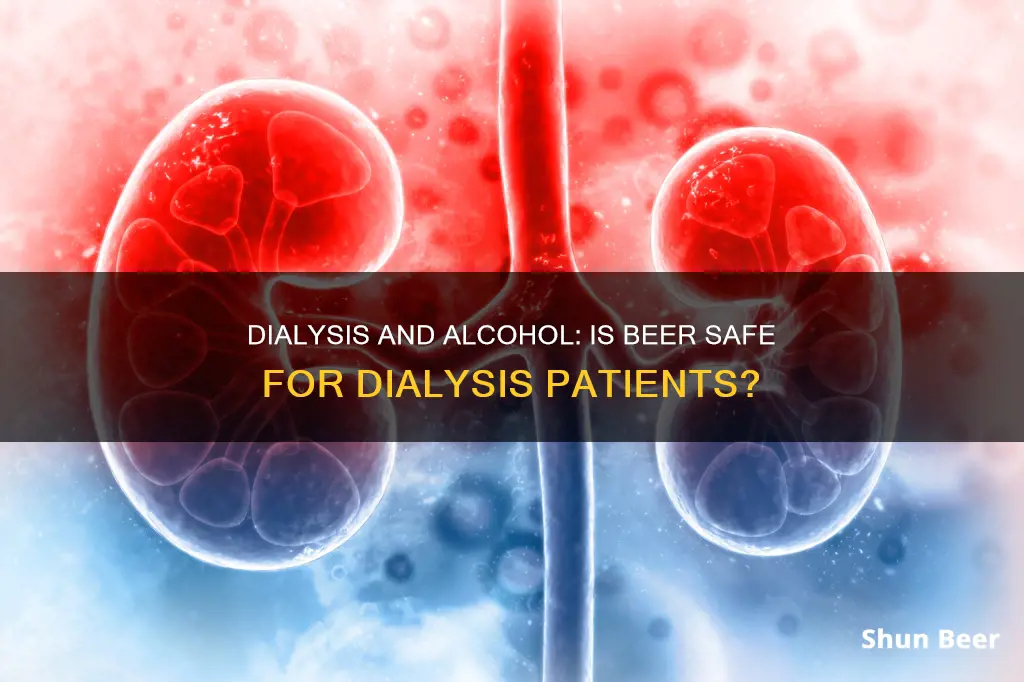
Whether or not people on dialysis can drink beer is a complex question. On the one hand, excessive alcohol consumption can lead to fluid overload, liver failure, harmful medication interactions, and even death. On the other hand, moderate alcohol consumption may be allowable for those on dialysis, provided it is counted within their normal fluid allowance and diet, and medications are taken into consideration. It is important to note that even a small amount of alcohol can be associated with an increased risk of death. Therefore, it is crucial for individuals on dialysis to consult with their doctor or dietitian to determine if alcohol is safe for them and to understand the specific types and amounts that are right for their situation.
| Characteristics | Values |
|---|---|
| Can people on dialysis drink beer? | Beer may be allowable for people on dialysis, but it must be counted within their normal fluid allowance and diet, and medicines must be taken into consideration. |
| How much beer can people on dialysis drink? | Beer should be limited to a 12-ounce serving. |
| What are the risks of drinking beer for people on dialysis? | Drinking beer can lead to fluid overload, liver failure, harmful medication interactions, and in some instances, death. |
| What are some alternatives to beer for people on dialysis? | Some alternatives to beer include cranberry juice, non-alcoholic piña colada, or apple cider. |
What You'll Learn

Beer and wine contain potassium and phosphorus
Potassium is an electrolyte, which means it has an electric charge and plays a crucial role in maintaining fluid balance, nerve function, heart rhythm, and muscle contraction in the body. While a moderate amount of potassium is beneficial, too much or too little can be harmful to health. The potassium dose in beer is 96 milligrams per 12 ounces, which is considered a moderate amount. In comparison, other alcoholic beverages like rum, vodka, and whiskey contain significantly lower amounts of potassium, with only 1 milligram per serving.
Phosphorus is another essential mineral that works alongside calcium to build strong bones and teeth. It is also involved in energy production, DNA synthesis, and nerve function. While phosphorus is naturally present in beer and wine, the concentration can vary depending on the region of production due to differences in water composition and other ingredients used. For example, a study analyzed the phosphorus content in beers from various countries and found the highest concentration in beers from Portugal, Italy, and Armenia.
For individuals on dialysis, it is crucial to monitor their fluid intake, and consuming beer or wine will contribute to their daily fluid allowance. Additionally, the presence of potassium and phosphorus in these beverages can further complicate the health conditions of dialysis patients. Therefore, it is generally recommended that dialysis patients limit their consumption of beer to 12 ounces and wine to 5 ounces. However, it is always best to consult with a nephrologist or dietitian to determine what is safe and appropriate for an individual's specific needs and medical history.
Hand-Pulled Beer Pumps: Traditional, Unique, and Fun!
You may want to see also

Alcohol may be allowable if counted within a normal fluid allowance
Alcohol May Be Allowable for People on Dialysis if Counted Within a Normal Fluid Allowance
Dialysis patients are often curious about whether they can consume alcohol, especially during festivities. While KidneyBuzz.com does not encourage alcohol consumption, moderate drinking may be allowable for people on dialysis. However, it is crucial to count it within your normal fluid allowance and consult your doctor or dietitian to determine if it is safe for you.
Fluids and Dialysis
For people on dialysis, managing fluid intake is essential for overall health. Fluids include not only drinks but also the liquids in the food you eat. Since the kidneys are no longer effectively removing excess fluid from the body, limiting fluid intake is crucial to prevent fluid overload, which puts a strain on the heart. Typically, dialysis patients are advised to limit their fluid intake to 32 ounces per day. This includes not only water but also other beverages and the fluids in the food you consume.
Alcohol as a Fluid
As a dialysis patient, if your doctor or dietitian gives you the go-ahead to consume alcohol, it is vital to count it within your daily fluid allowance. Alcoholic beverages contain fluids and contribute to your daily fluid intake. A standard beer, for instance, contains 12 ounces of fluid. Therefore, drinking a single beer would leave you with only 20 ounces of fluid for the rest of the day.
Counting Alcohol in Your Diet
In addition to counting alcohol as a fluid, it is essential to consider its place in your diet. Alcohol provides no nutritional benefits but does contain calories, which can add up quickly. Moreover, some alcoholic drinks are high in sugar and carbohydrates, which can affect blood sugar levels, especially for people with diabetes. It is crucial to be mindful of these factors when planning your meals and snacks for the day.
Medication Interactions
Before consuming alcohol, it is imperative to consider any medications you are taking. Certain medications, both prescription and over-the-counter, may interact with alcohol and affect their effectiveness. Additionally, some medications may increase your blood alcohol level. Therefore, it is essential to check drug labels and consult your pharmacist or doctor to ensure that alcohol consumption will not interfere with your medications.
Moderation is Key
If you are cleared to consume alcohol, moderation is crucial. For women and older individuals, moderate drinking typically means one drink per day, while for men, it is two drinks per day. It is important to note that these limits are based on average body weight and that women tend to be more affected by alcohol due to their lower body water content. Therefore, it is essential to follow the recommendations provided by your healthcare team regarding the types and amounts of alcohol that are safe for you.
Hypoglycemia and Beer: Is It Safe to Drink?
You may want to see also

Alcohol can cause high blood pressure and liver disease
Alcohol can be detrimental to people's health, especially those with certain conditions, such as those on dialysis. Drinking too much alcohol can lead to high blood pressure, also known as hypertension. Alcohol consumption can cause the heart muscle to stretch and droop, resulting in cardiomyopathy, and can also interfere with the heart's regular rhythm, leading to arrhythmias. These issues can, in turn, contribute to high blood pressure.
Additionally, alcohol can negatively impact the liver, leading to liver disease. Heavy drinking causes liver inflammation and can result in steatosis, commonly known as fatty liver. Alcohol also affects the pancreas, causing it to produce toxic substances that can lead to pancreatitis, a dangerous inflammation that results in swelling, pain, and impaired enzyme and hormone production for proper digestion.
For people on dialysis, drinking alcohol may be permissible in moderation and within their fluid allowance, but it is crucial to consult a doctor or dietitian first. Alcohol has no nutritional benefit and can interfere with medications, so it must be consumed cautiously, if at all, for those on dialysis.
To maintain overall health, it is recommended to limit alcohol consumption. The American Heart Association advises no more than two drinks per day for men and one drink per day for women.
Beer Drinking Post-Whipple: What You Need to Know
You may want to see also

Spirits have the least amount of potassium and phosphorus
For people on dialysis, drinking alcohol may be allowable, but it must be counted within your normal fluid allowance and diet, and medications must be taken into consideration. It is important to talk to your doctor or dietitian before drinking any alcohol. If you have diabetes and are on dialysis, alcohol may be safe to drink if your blood sugar level is under control. However, alcohol on an empty stomach can cause blood sugar levels to drop in those with diabetes.
If you are on dialysis, it is important to watch out for drinks high in potassium or phosphorus. Spirits such as whiskey, bourbon, scotch, vodka, gin, tequila, and rum have the least amount of potassium and phosphorus. However, it is important to limit these to a 1.5-ounce serving (1 shot). Be aware that mixers can add to the potassium or phosphorus content of a drink. Select mixers that are low in potassium and phosphorus, such as club soda, sprite, tonic water, or an ounce of fresh lime or lemon juice.
In general, drinking alcohol can harm the kidneys, leading to high blood pressure, dehydration, and liver disease. It is important to limit alcohol intake to protect kidney health. Heavy drinking on a regular basis has been found to double the risk for kidney disease. Binge drinking can also cause a sudden drop in kidney function known as "acute kidney injury," which may lead to lasting kidney damage. Therefore, moderation is key when it comes to drinking alcohol, whether you are on dialysis or not.
Brewery Beer: Can I Drink It Elsewhere?
You may want to see also

Alcohol has no nutritional benefit but does contain calories
Alcohol is devoid of any nutritional benefit to the body. It contains no protein, minerals, or vitamins and actively inhibits the absorption of vital nutrients. Alcohol is a chemical substance made through the fermentation process, which uses sugars and yeast. The type of alcohol found in alcoholic drinks is called ethyl alcohol or ethanol.
Alcohol does, however, contain calories, which are often referred to as "empty calories" due to their lack of accompanying nutritional value. Alcohol has seven calories per gram, which is more than both protein and carbohydrates, which have four calories per gram. This means that drinking alcohol can contribute to weight gain, especially when consumed in excess.
The calories in alcohol are not available to the muscles and are instead treated by the body as fat. Alcohol sugars are converted into fatty acids, and the body's ability to heal and repair itself is slowed down. Alcohol also disrupts the water balance in muscle cells, affecting their ability to produce adenosine triphosphate (ATP), the primary source of energy for muscles.
In addition to the lack of nutritional value, alcohol consumption can lead to various health problems, including cardiovascular disease, liver disease, digestive issues, and certain types of cancer. It is important to note that the negative consequences of alcohol consumption can far outweigh any potential benefits, and moderation is always key.
Alcohol and Breastfeeding: Is Drinking Wine or Beer Safe?
You may want to see also







